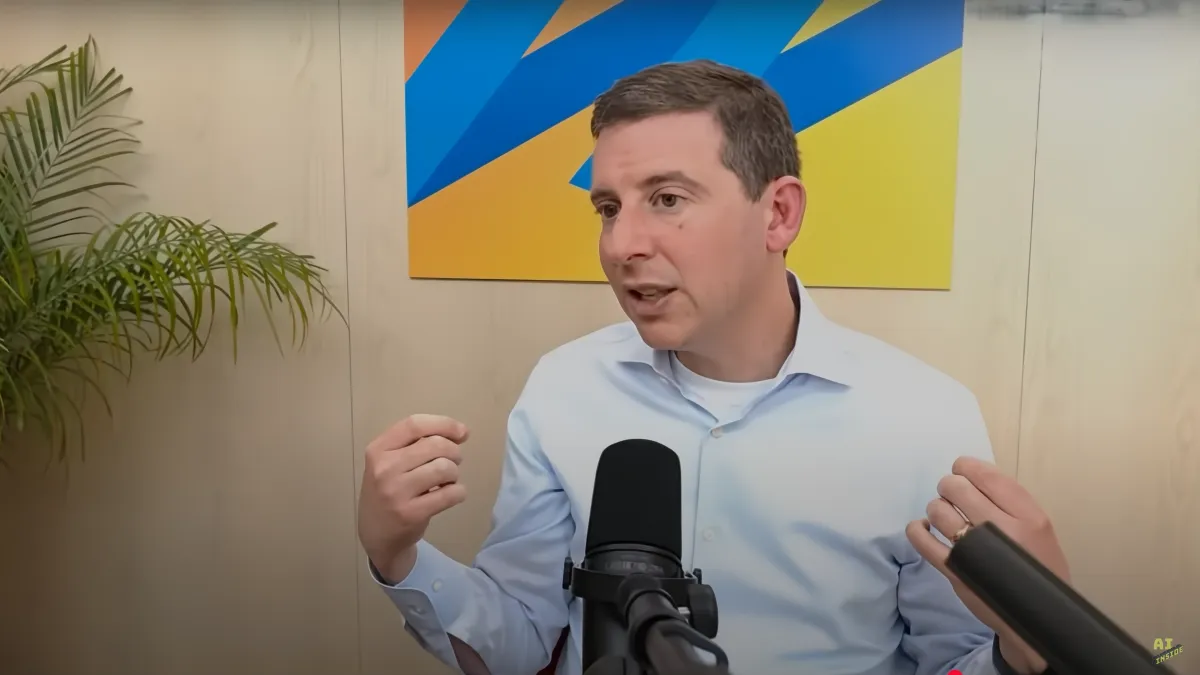
Google executives are pushing back against research showing significant traffic declines for websites after the company's AI-powered search features began generating summaries that answer users' questions directly. The defense comes amid mounting evidence that publishers are experiencing substantial losses in organic traffic since AI Overviews became standard in search results.
Speaking on the AI Inside podcast on May 21, 2025, Nick Fox, VP of Search at Google, questioned the methodologies used in studies showing click-through rate decreases, stating that "some of these studies sort of say this site has lost traffic but you know the time frame they look at was before AIO reviews even launched right." Fox leads Google's search product team, which oversees the integration of artificial intelligence into the company's core search offerings.
The comments represent Google's most direct response to mounting concerns from publishers about AI Overviews' impact on website traffic. Fox insisted that "from our point of view the web is thriving" and suggested that studies claiming traffic losses had questionable methodologies. He cited data showing web content growth as evidence supporting his position.
Get the PPC Land newsletter ✉️ for more like this.
Summary
Who: Nick Fox, VP of Search at Google, defended the company's AI search features during an interview with Jason Howell on the AI Inside podcast. Fox leads Google's search product team responsible for integrating artificial intelligence into core search offerings.
What: Google executives disputed studies showing significant traffic declines for websites after AI Overviews began providing direct answers in search results. The defense came as multiple research studies documented click-through rate decreases of 34.5% to 54.6% for websites when AI summaries appear.
When: The interview took place on May 21, 2025, during Google's broader rollout of AI Mode to all US users. This occurred amid mounting evidence from April and May 2025 studies showing substantial organic traffic losses for publishers.
Where: The discussion addressed global impacts on website traffic and the search industry, with specific focus on AI Overviews' expansion to over 100 countries and new European markets including Germany, Belgium, Ireland, Italy, Austria, Poland, Portugal, Spain, and Switzerland.
Why: The matter is significant for the marketing community because it represents a fundamental shift in how search engines deliver information to users. AI-powered features that provide direct answers reduce the need for users to visit websites, potentially transforming digital marketing strategies and website monetization models while creating new challenges for content creators and publishers who depend on search traffic.
Multiple studies document significant traffic decreases
The defense comes despite several comprehensive studies documenting substantial traffic declines. Research from Ahrefs published on April 17, 2025, analyzed 300,000 keywords and found that AI Overviews reduced organic clicks to top-ranking websites by 34.5%. The study compared clickthrough rates for top positions in search results with and without AI Overviews present.
According to the Ahrefs methodology, researchers examined 150,000 keywords that trigger AI Overviews and 150,000 informational keywords without the feature. For standard informational keywords, the average position-one CTR dropped from 0.056 in March 2024 to 0.031 in March 2025. For AI Overview keywords, the decline was even more pronounced, falling from 0.073 in March 2024 to 0.026 in March 2025.
Additional research published by Tracy McDonald on February 4, 2025, examining approximately 10,000 keywords with informational intent, showed similar patterns. According to the research, organic click-through rates for queries featuring AIOs dropped from 1.41% to 0.64% year-over-year, marking a 54.6% decrease.

Google claims web content continues expanding
Fox countered these findings by highlighting Google's internal metrics on web growth. He referenced data showing that the number of unique new pages that Google's crawlers have seen increased 45% when comparing April 2025 versus April 2023. This metric, Fox argued, demonstrates the web's continued vitality despite AI integration.
The Google executive also emphasized that AI technology serves as a complement rather than replacement for traditional web content, stating it's "unlikely that a single paragraph or a couple of paragraphs is going to replace a full well ressearched um you know article on something."
Fox positioned the current changes within historical context, noting that "people have been talking about the death of the web for as long as I've been at Google" and that "the death of the web has been coming for 25 years it's not happening." He suggested that technological advances typically lead to content expansion rather than reduction.
AI Mode launch expands Google's search capabilities
The interview took place during Google's broader rollout of AI Mode, an experimental search experience that provides conversational interfaces for complex queries. Google announced on May 1, 2025, that AI Mode became "immediately available to all US users over 18 years old" after lifting its waitlist restrictions.
AI Mode represents a significant departure from traditional search interfaces. According to Google's documentation, users engage with AI Mode by "asking longer, harder questions, using follow-up questions to hone in on what they really want to know." The system processes queries that are typically twice as long as standard search terms.
The technology underlying AI Mode uses Google's "query fan-out technique" to break down complex questions into multiple subtopics and process hundreds of related searches simultaneously. This approach enables comprehensive responses that synthesize information from multiple sources.
Technical integration creates tracking complexities
The rollout of AI features has created technical challenges for website analytics. Google officially confirmed on June 17, 2025, that AI Mode clicks, impressions, and position data now count toward totals in Search Console performance reports. This integration addressed weeks of speculation about tracking gaps affecting website analytics.
The tracking integration followed reports from SEO professionals who began noticing AI Mode data appearing in their Search Console accounts before Google's official announcement. Patrick Stox, a technical SEO expert, confirmed the tracking functionality through social media posts on June 12, 2025, noting that "Confirming that non-labs AI Mode clicks are recorded in GSC."
According to industry observations, some estimates suggest AI Mode represents more than 1% of total searches. This percentage indicates substantial traffic volume that previously went untracked in website analytics during the initial rollout period.
Publishers report mixed results from AI integration
While Google maintains that AI features benefit the broader web ecosystem, individual publishers report varying experiences. Some data suggests improved engagement quality for visitors who do click through from AI-generated responses, though overall traffic volumes have declined for many sites.
Research published by Kevin Indig and Eric van Buskirk on May 12, 2025, revealed user behavior patterns within AI Overviews. The study found that while 88% of users clicked "show more" to expand truncated AI Overviews, the median scroll depth was just 30% - meaning most users never even see content beyond the initial summary.
The study tracked 70 users across eight search tasks and documented that social proof platforms - particularly Reddit, YouTube, and other community forums - have become major beneficiaries of the traffic that doesn't stay within AI Overviews. When users leave search results after viewing AI Overviews, these community platforms receive disproportionate click shares.
European expansion raises regulatory questions
Google's AI search features have expanded internationally despite ongoing regulatory scrutiny. The company launched AI Overviews in nine European countries on March 26, 2025, just one week after the European Commission released preliminary findings that Alphabet, Google's parent company, may be violating the Digital Markets Act (DMA) through preferential treatment of its own services in search results.
The European rollout included Germany, Belgium, Ireland, Italy, Austria, Poland, Portugal, Spain, and Switzerland, with the feature available in multiple languages depending on the region. This expansion brought AI Overviews to additional markets despite regulatory concerns about competitive practices.
Legal experts have questioned whether AI-powered search features can withstand regulatory scrutiny in markets with strict digital competition laws. Luiza Jarovsky, co-founder of AI Tech Privacy and a PhD researcher specializing in AI governance, questioned whether AI Overviews could withstand legal scrutiny in the EU, writing "I don't think Google's AI Mode will survive legal scrutiny in the EU."
Advertising integration creates new revenue streams
Google has begun integrating advertising directly into AI-generated search responses, creating new monetization opportunities for the platform. The company launched ads within AI Overviews for mobile users in the United States, with Shashi Thakur, VP/GM of Google Ads, reporting that "the company has carefully tested the integration of ads within AI Overviews over several months."
The advertising integration includes both search and shopping advertisements within AI-generated summaries when relevant to user queries. Google reports that users have found ads within AI Overviews helpful, as they can quickly connect with relevant businesses, products, and services at the exact moment of need.
According to Google's implementation strategy, advertisers do not need to take any additional action to participate in this new ad placement. The system leverages existing campaign structures and Google's AI to determine the most relevant ads to display within the overviews.
Industry adaptation and future implications
The search marketing industry is adapting to these changes with varying levels of success. A poll conducted among SEO professionals in May 2025 revealed significant apprehension about AI integration's impact on organic traffic strategies. According to Barry Schwartz's reporting on the poll results, "About 45% said they're scared out of mind only 15% they're excited" about Google's AI Mode replacing traditional search.
Research suggests fundamental shifts in user behavior may require new approaches to content strategy and website optimization. A study published by Semrush on June 9, 2025, found that AI search visitors demonstrate 4.4 times higher value compared to traditional organic search visitors when measured by conversion rates.
This higher conversion rate stems from AI systems providing comprehensive information during the research phase, meaning users arrive at websites already equipped with knowledge about options and value propositions. However, the research also indicates that overall traffic volumes may decrease as AI responses satisfy user needs without requiring website visits.
The Semrush study projects significant timeline implications for the industry. Digital marketing and SEO-related topics may start generating more visitors from AI search than traditional search by early 2028, while AI search channels may drive equal economic value to traditional search by 2027.
Timeline
March 26, 2025: Google expands AI Overviews to more European markets
April 17, 2025: Google's AI Overviews cut organic clicks by 34.5% despite company claims
May 1, 2025: Google opens AI Mode to all US users
May 16, 2025: Most users only read top third of Google AI Overviews
May 21, 2025: Nick Fox interview on AI Inside podcast
May 30, 2025: SEOs express widespread fear over Google's AI Mode rollout
June 17, 2025: Google AI Mode now counts toward Search Console totals
June 18, 2025: Google explains "great decoupling" of search clicks and impressions


